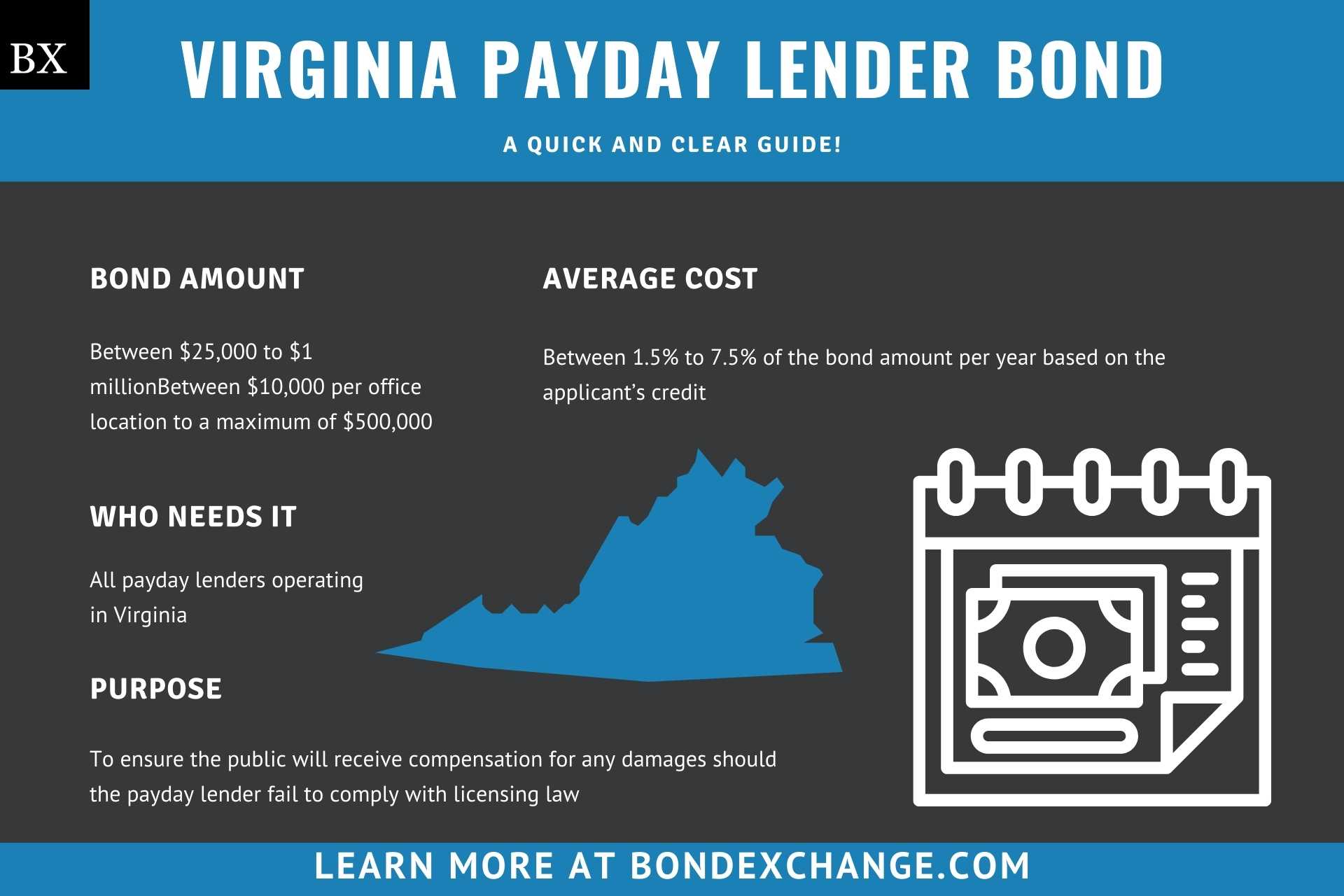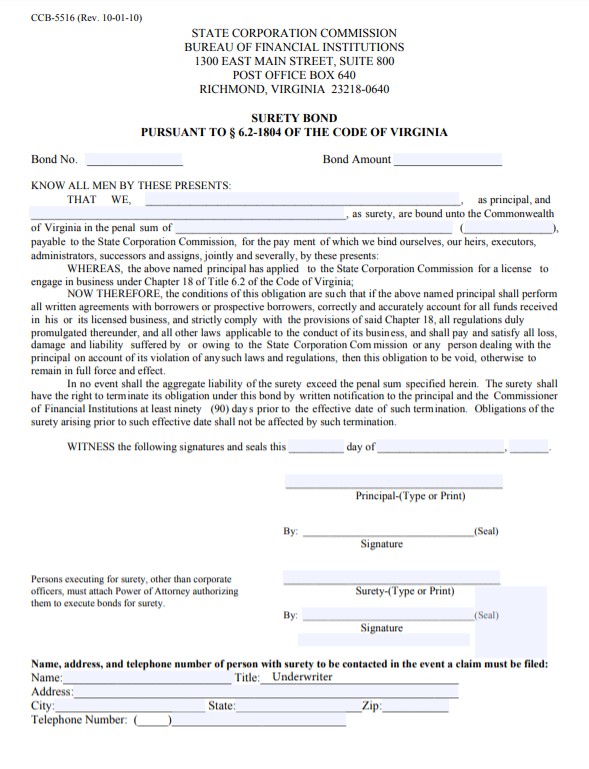Virginia Payday Lender Bond: A Comprehensive Guide
August 31, 2021

This guide provides information for insurance agents to help payday lenders obtain Virginia Payday Lender Bonds
At a Glance:
- Average Cost: Between 1.5% to 7.5% of the bond amount per year based on the applicant’s credit
- Bond Amount: Between $10,000 per office location to a maximum of $500,000
- Who Needs it: All payday lenders operating in Virginia
- Purpose: To ensure the public will receive compensation for any damages should the payday lender fail to comply with licensing law
- Who Regulates Payday Lenders In Virginia: The Virginia State Corporation Commission
Background
Virginia statute 6.2-1801 requires all payday lenders operating in the state to obtain a license with the State Corporation Commission. The Virginia legislature enacted the licensing laws and regulations to ensure that payday lenders engage in ethical business practices. In order to provide financial security for the enforcement of the licensing law, payday lenders must purchase and maintain a surety bond to be eligible for licensure.
What is the Purpose of the Virginia Payday Lender Bond?
Virginia requires payday lenders to purchase a surety bond as part of the application process to obtain a business license. The bond ensures that the public will receive compensation for financial harm if the payday lender fails to comply with the licensing regulations set forth in Virginia statutes Title 6.2 Chapter 18. Specifically, the bond protects the public in the event the payday lender engages in any acts of fraud or breaches any contracts made with consumers. In short, the bond is a type of insurance that protects the public if the payday lender breaks licensing laws.

How Can an Insurance Agent Obtain a Virginia Payday Lender Surety Bond?
BondExchange makes obtaining a Virginia Payday Lender Bond easy. Simply login to your account and use our keyword search to find the “payday” bond in our database. Don’t have a login? Enroll now and let us help you satisfy your customers’ needs. Our friendly underwriting staff is available by phone (800) 438-1162, email or chat from 7:30 AM to 7:00 PM EST to assist you.
At BondExchange, our 40 years of experience, leading technology, and access to markets ensures that we have the knowledge and resources to provide your clients with fast and friendly service whether obtaining quotes or issuing bonds.
Is a Credit Check Required for the Virginia Payday Lender Bond?
Surety companies will run a credit check on the owners of the lending company to determine eligibility and pricing for the Virginia Payday Lender Bond. Applicants with excellent credit and work experience can expect to receive the best rates. Applicants with poor credit may be declined by some surety companies or pay higher rates. The credit check is a “soft hit”, meaning that the credit check will not affect the lender’s credit.
How Much Does the Virginia Payday Lender Bond Cost?
The Virginia Payday Lender Surety Bond can cost anywhere between 1.5% to 7.5% of the bond amount per year. Insurance companies determine the rate based on several factors including your customer’s credit score and experience. The chart below offers a quick reference for the approximate bond cost on a $10,000 bond requirement.
$10,000 Payday Lender Bond
| Credit Score | Bond Cost (1 year) |
|---|---|
| 800+ | $150 |
| 650 – 799 | $200 |
| 600 – 649 | $400 |
| 550 – 599 | $750 |
*The credit score ranges do not include other factors that may result in a change to the annual premium offered to your customers, including but not limited to, years of experience and underlying credit factors contained within the business owner’s credit report.
How Does Virginia Define “Payday Lender?”
To paraphrase Virginia statute 6.2-1800, a payday lender is any business entity who issues loans that last between 4 to 24 months, are not higher than $2,500, and do not have an interest rate higher than 36%.
How Do Payday Lenders Apply for a License in Virginia?
Payday Lenders in Virginia must navigate several steps to secure their license. Below are the general guidelines, but payday lenders should refer to the application form for details on the process.
Payday lenders are required to obtain the Virginia “Short-Term Lender” License
License Period – The Virginia Short-Term Lender License does not expire unless surrendered, suspended or revoked
Step 1 – Purchase a Surety Bond
Payday Lenders must purchase and maintain a surety bond with a limit of $10,000 per office location to a maximum of $500,000
Step 2 – Meet the Liquid Asset Requirements
Payday lenders must at all times maintain at least $25,000 in unencumbered liquid assets per office location. Payday lenders must submit certification verifying they meet this requirement.
Step 3 – Open a Deposit Account
Applicants for the Short-Term Lender License must establish a deposit account and keep it open for at least one year before applying for licensure. Payday lenders must submit a depository institution authorization form verifying they satisfy this requirement.
Step 3 – Complete the Application
All Virginia Short-Term Lender License applications should be mailed to the following address:
Bureau of Financial Institutions
State Corporation Commission
1300 East Main Street, Suite 800
Post Office Box 640
Richmond, Virginia 23218-0640
Applicants must complete the application in its entirety, and submit the following items:
-
- Organizational chart detailing the company’s hierarchy
- Personal financial report and disclosure statement for each company officer
- Employment and business affiliation disclosure for each company officer
- Financial reports for the applicant and all companies owning 10% or more of the business applying for licensure
- Evidence of registration with the Clerk of the State Corporation Division
Payday lenders must pay a $500 fee when submitting their license application.
Do Virginia Payday Lenders Need to Renew Their License?
No, the Virginia Short-Term Lender License does not expire unless surrendered, suspended or revoked
What Are the Insurance Requirements for the Virginia Short-Term Lender License?
Virginia does not require payday lenders to obtain any form of liability insurance as a prerequisite to obtaining a business license. Payday Lenders must purchase and maintain a surety bond with a limit of $10,000 per office location to a maximum of $500,000.
How Do Virginia Payday Lenders File Their Bond?
Payday lenders should mail the completed bond form, including the power of attorney, to the following address:
Bureau of Financial Institutions
State Corporation Commission
1300 East Main Street, Suite 800
Post Office Box 640
Richmond, Virginia 23218-0640
The Payday Lender Surety Bond requires signatures from both the surety company that issues the bond and a representative from the lending company. The surety company should include the following information on the bond form:
- Legal name entity/individual(s) buying the bond
- Surety company’s name
- Bond amount
- Date the bond is signed
What Can Virginia Payday Lenders Do to Avoid Claims Against Their Bond?
To avoid claims against their bond, payday lenders in Virginia must follow all license regulations in the state, including some of the most important issues below that, tend to cause claims:
- Do not engage in any acts of fraud
- Do not breach any contracts made with consumers
What Other Insurance Products Can Agents Offer Payday Lenders in Virginia?
Virginia does not require payday lenders to obtain any form of liability insurance as a prerequisite to obtaining a business license. However, most reputable businesses will seek to obtain this insurance anyway. Bonds are our only business at BondExchange, so we do not issue liability insurance, but our agents often utilize brokers for this specific line of business. A list of brokers in this space can be found here.
How Can Insurance Agents Prospect for Virginia Payday Lender Customers?
Virginia conveniently provides a public database to search for active payday lenders in the state. The database can be accessed here. Contact BondExchange for help developing a marketing piece. Agents can also leverage our print-mail relationships for discounted mailing services.

